0. Business Ethics Assignment 2.
VerifiedAdded on 2023/04/21
|11
|2725
|114
AI Summary
Contribute Materials
Your contribution can guide someone’s learning journey. Share your
documents today.

0
Business Ethics
Assignment 2
Business Ethics
Assignment 2
Secure Best Marks with AI Grader
Need help grading? Try our AI Grader for instant feedback on your assignments.
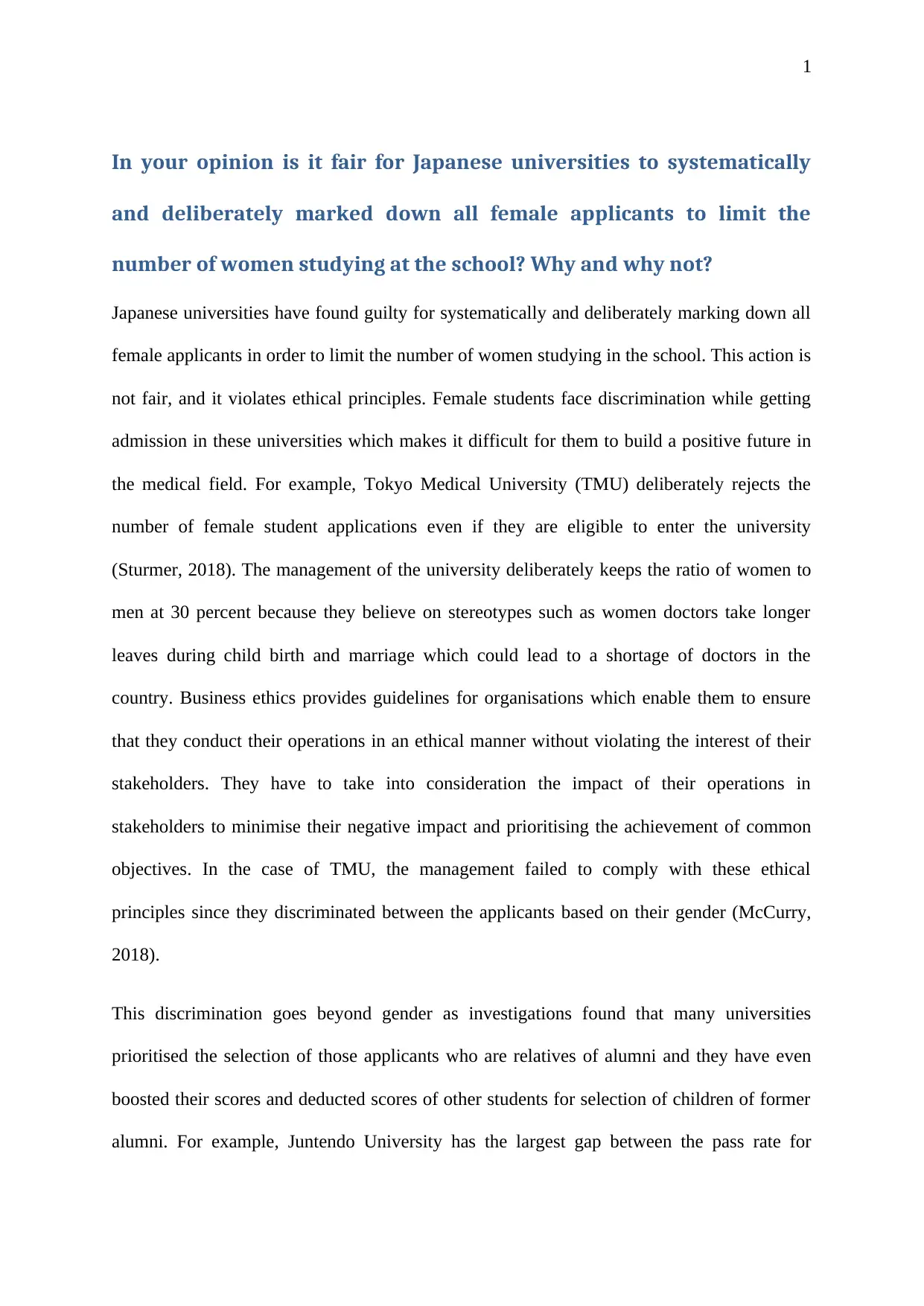
1
In your opinion is it fair for Japanese universities to systematically
and deliberately marked down all female applicants to limit the
number of women studying at the school? Why and why not?
Japanese universities have found guilty for systematically and deliberately marking down all
female applicants in order to limit the number of women studying in the school. This action is
not fair, and it violates ethical principles. Female students face discrimination while getting
admission in these universities which makes it difficult for them to build a positive future in
the medical field. For example, Tokyo Medical University (TMU) deliberately rejects the
number of female student applications even if they are eligible to enter the university
(Sturmer, 2018). The management of the university deliberately keeps the ratio of women to
men at 30 percent because they believe on stereotypes such as women doctors take longer
leaves during child birth and marriage which could lead to a shortage of doctors in the
country. Business ethics provides guidelines for organisations which enable them to ensure
that they conduct their operations in an ethical manner without violating the interest of their
stakeholders. They have to take into consideration the impact of their operations in
stakeholders to minimise their negative impact and prioritising the achievement of common
objectives. In the case of TMU, the management failed to comply with these ethical
principles since they discriminated between the applicants based on their gender (McCurry,
2018).
This discrimination goes beyond gender as investigations found that many universities
prioritised the selection of those applicants who are relatives of alumni and they have even
boosted their scores and deducted scores of other students for selection of children of former
alumni. For example, Juntendo University has the largest gap between the pass rate for
In your opinion is it fair for Japanese universities to systematically
and deliberately marked down all female applicants to limit the
number of women studying at the school? Why and why not?
Japanese universities have found guilty for systematically and deliberately marking down all
female applicants in order to limit the number of women studying in the school. This action is
not fair, and it violates ethical principles. Female students face discrimination while getting
admission in these universities which makes it difficult for them to build a positive future in
the medical field. For example, Tokyo Medical University (TMU) deliberately rejects the
number of female student applications even if they are eligible to enter the university
(Sturmer, 2018). The management of the university deliberately keeps the ratio of women to
men at 30 percent because they believe on stereotypes such as women doctors take longer
leaves during child birth and marriage which could lead to a shortage of doctors in the
country. Business ethics provides guidelines for organisations which enable them to ensure
that they conduct their operations in an ethical manner without violating the interest of their
stakeholders. They have to take into consideration the impact of their operations in
stakeholders to minimise their negative impact and prioritising the achievement of common
objectives. In the case of TMU, the management failed to comply with these ethical
principles since they discriminated between the applicants based on their gender (McCurry,
2018).
This discrimination goes beyond gender as investigations found that many universities
prioritised the selection of those applicants who are relatives of alumni and they have even
boosted their scores and deducted scores of other students for selection of children of former
alumni. For example, Juntendo University has the largest gap between the pass rate for
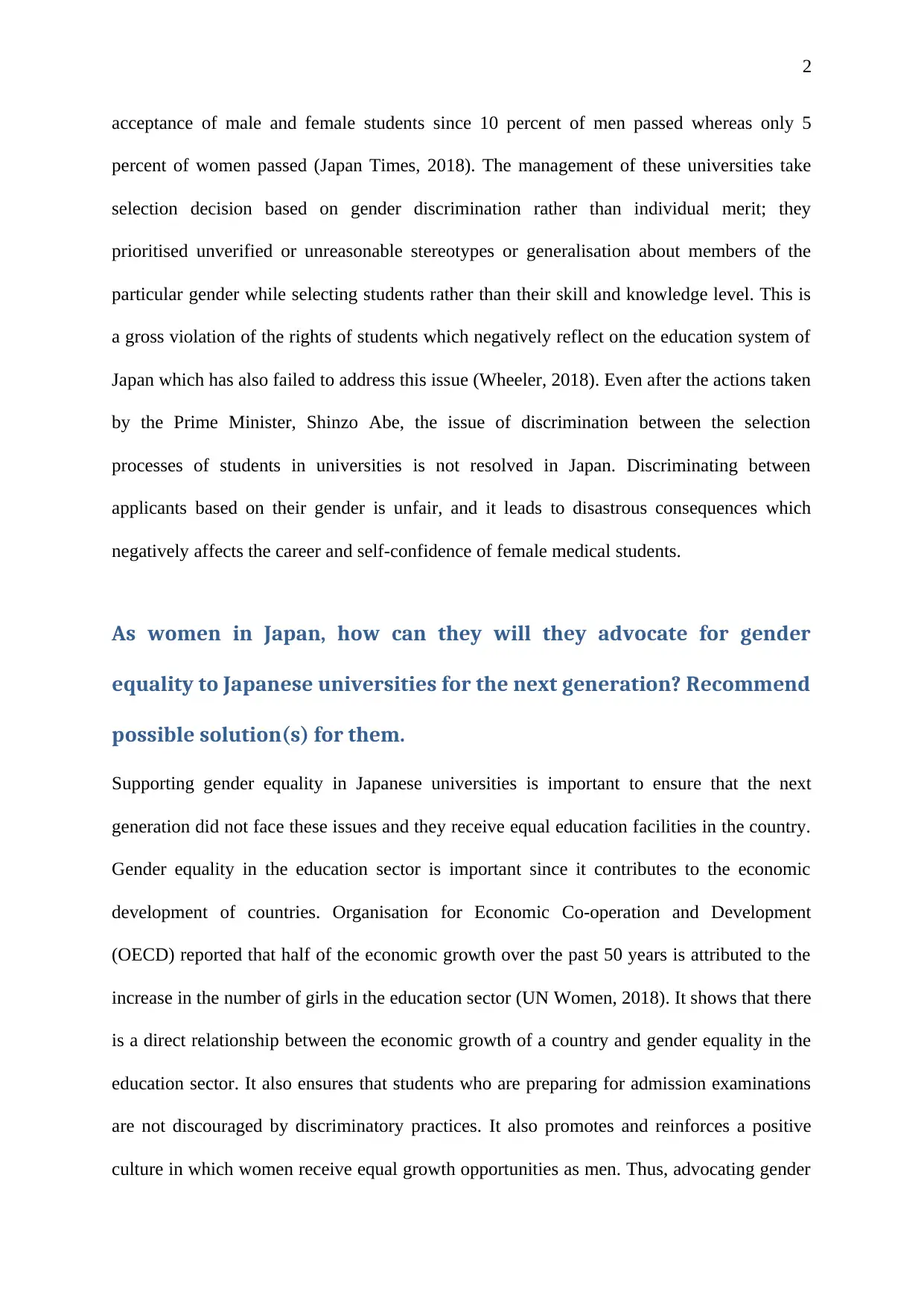
2
acceptance of male and female students since 10 percent of men passed whereas only 5
percent of women passed (Japan Times, 2018). The management of these universities take
selection decision based on gender discrimination rather than individual merit; they
prioritised unverified or unreasonable stereotypes or generalisation about members of the
particular gender while selecting students rather than their skill and knowledge level. This is
a gross violation of the rights of students which negatively reflect on the education system of
Japan which has also failed to address this issue (Wheeler, 2018). Even after the actions taken
by the Prime Minister, Shinzo Abe, the issue of discrimination between the selection
processes of students in universities is not resolved in Japan. Discriminating between
applicants based on their gender is unfair, and it leads to disastrous consequences which
negatively affects the career and self-confidence of female medical students.
As women in Japan, how can they will they advocate for gender
equality to Japanese universities for the next generation? Recommend
possible solution(s) for them.
Supporting gender equality in Japanese universities is important to ensure that the next
generation did not face these issues and they receive equal education facilities in the country.
Gender equality in the education sector is important since it contributes to the economic
development of countries. Organisation for Economic Co-operation and Development
(OECD) reported that half of the economic growth over the past 50 years is attributed to the
increase in the number of girls in the education sector (UN Women, 2018). It shows that there
is a direct relationship between the economic growth of a country and gender equality in the
education sector. It also ensures that students who are preparing for admission examinations
are not discouraged by discriminatory practices. It also promotes and reinforces a positive
culture in which women receive equal growth opportunities as men. Thus, advocating gender
acceptance of male and female students since 10 percent of men passed whereas only 5
percent of women passed (Japan Times, 2018). The management of these universities take
selection decision based on gender discrimination rather than individual merit; they
prioritised unverified or unreasonable stereotypes or generalisation about members of the
particular gender while selecting students rather than their skill and knowledge level. This is
a gross violation of the rights of students which negatively reflect on the education system of
Japan which has also failed to address this issue (Wheeler, 2018). Even after the actions taken
by the Prime Minister, Shinzo Abe, the issue of discrimination between the selection
processes of students in universities is not resolved in Japan. Discriminating between
applicants based on their gender is unfair, and it leads to disastrous consequences which
negatively affects the career and self-confidence of female medical students.
As women in Japan, how can they will they advocate for gender
equality to Japanese universities for the next generation? Recommend
possible solution(s) for them.
Supporting gender equality in Japanese universities is important to ensure that the next
generation did not face these issues and they receive equal education facilities in the country.
Gender equality in the education sector is important since it contributes to the economic
development of countries. Organisation for Economic Co-operation and Development
(OECD) reported that half of the economic growth over the past 50 years is attributed to the
increase in the number of girls in the education sector (UN Women, 2018). It shows that there
is a direct relationship between the economic growth of a country and gender equality in the
education sector. It also ensures that students who are preparing for admission examinations
are not discouraged by discriminatory practices. It also promotes and reinforces a positive
culture in which women receive equal growth opportunities as men. Thus, advocating gender
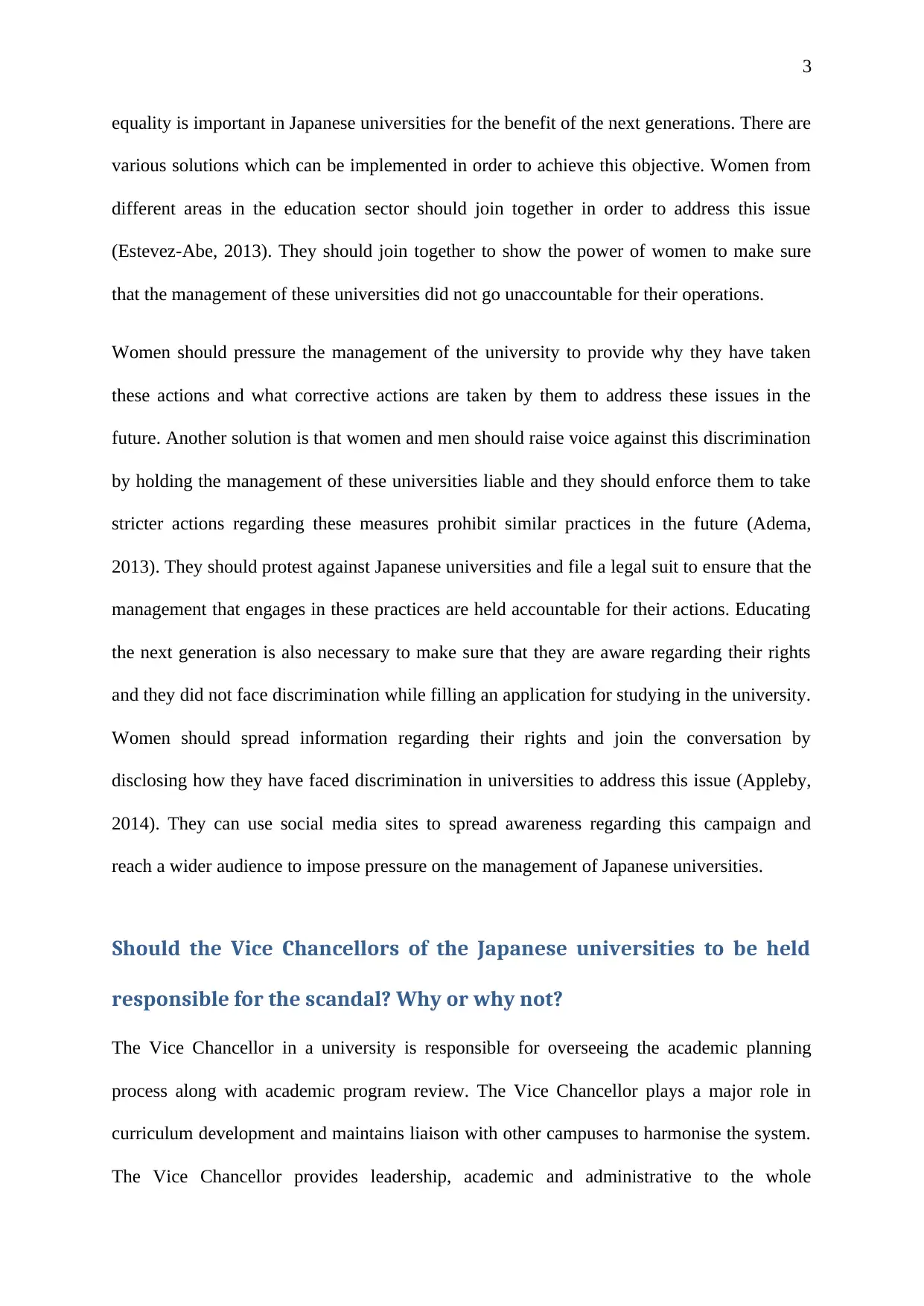
3
equality is important in Japanese universities for the benefit of the next generations. There are
various solutions which can be implemented in order to achieve this objective. Women from
different areas in the education sector should join together in order to address this issue
(Estevez-Abe, 2013). They should join together to show the power of women to make sure
that the management of these universities did not go unaccountable for their operations.
Women should pressure the management of the university to provide why they have taken
these actions and what corrective actions are taken by them to address these issues in the
future. Another solution is that women and men should raise voice against this discrimination
by holding the management of these universities liable and they should enforce them to take
stricter actions regarding these measures prohibit similar practices in the future (Adema,
2013). They should protest against Japanese universities and file a legal suit to ensure that the
management that engages in these practices are held accountable for their actions. Educating
the next generation is also necessary to make sure that they are aware regarding their rights
and they did not face discrimination while filling an application for studying in the university.
Women should spread information regarding their rights and join the conversation by
disclosing how they have faced discrimination in universities to address this issue (Appleby,
2014). They can use social media sites to spread awareness regarding this campaign and
reach a wider audience to impose pressure on the management of Japanese universities.
Should the Vice Chancellors of the Japanese universities to be held
responsible for the scandal? Why or why not?
The Vice Chancellor in a university is responsible for overseeing the academic planning
process along with academic program review. The Vice Chancellor plays a major role in
curriculum development and maintains liaison with other campuses to harmonise the system.
The Vice Chancellor provides leadership, academic and administrative to the whole
equality is important in Japanese universities for the benefit of the next generations. There are
various solutions which can be implemented in order to achieve this objective. Women from
different areas in the education sector should join together in order to address this issue
(Estevez-Abe, 2013). They should join together to show the power of women to make sure
that the management of these universities did not go unaccountable for their operations.
Women should pressure the management of the university to provide why they have taken
these actions and what corrective actions are taken by them to address these issues in the
future. Another solution is that women and men should raise voice against this discrimination
by holding the management of these universities liable and they should enforce them to take
stricter actions regarding these measures prohibit similar practices in the future (Adema,
2013). They should protest against Japanese universities and file a legal suit to ensure that the
management that engages in these practices are held accountable for their actions. Educating
the next generation is also necessary to make sure that they are aware regarding their rights
and they did not face discrimination while filling an application for studying in the university.
Women should spread information regarding their rights and join the conversation by
disclosing how they have faced discrimination in universities to address this issue (Appleby,
2014). They can use social media sites to spread awareness regarding this campaign and
reach a wider audience to impose pressure on the management of Japanese universities.
Should the Vice Chancellors of the Japanese universities to be held
responsible for the scandal? Why or why not?
The Vice Chancellor in a university is responsible for overseeing the academic planning
process along with academic program review. The Vice Chancellor plays a major role in
curriculum development and maintains liaison with other campuses to harmonise the system.
The Vice Chancellor provides leadership, academic and administrative to the whole
Secure Best Marks with AI Grader
Need help grading? Try our AI Grader for instant feedback on your assignments.
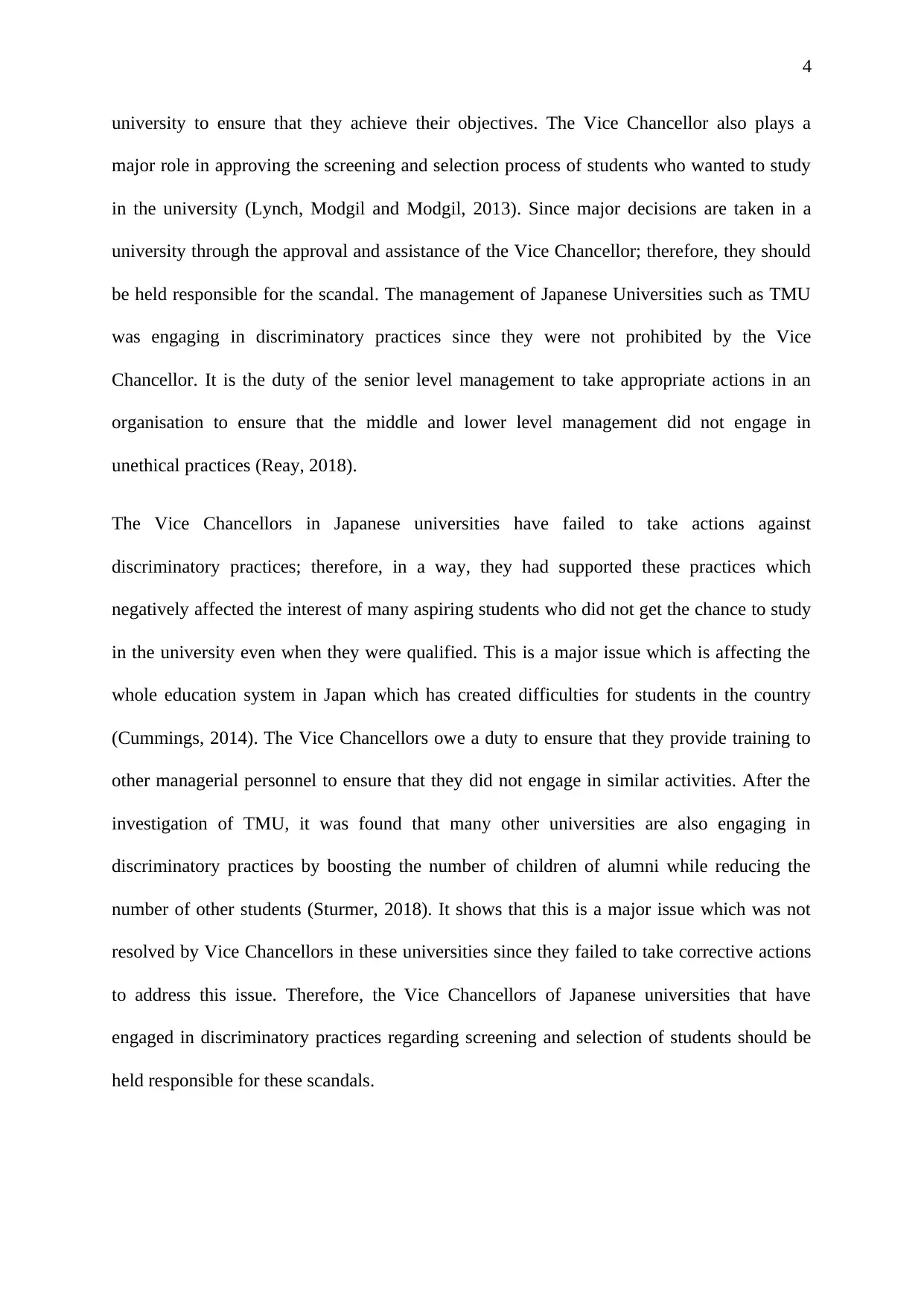
4
university to ensure that they achieve their objectives. The Vice Chancellor also plays a
major role in approving the screening and selection process of students who wanted to study
in the university (Lynch, Modgil and Modgil, 2013). Since major decisions are taken in a
university through the approval and assistance of the Vice Chancellor; therefore, they should
be held responsible for the scandal. The management of Japanese Universities such as TMU
was engaging in discriminatory practices since they were not prohibited by the Vice
Chancellor. It is the duty of the senior level management to take appropriate actions in an
organisation to ensure that the middle and lower level management did not engage in
unethical practices (Reay, 2018).
The Vice Chancellors in Japanese universities have failed to take actions against
discriminatory practices; therefore, in a way, they had supported these practices which
negatively affected the interest of many aspiring students who did not get the chance to study
in the university even when they were qualified. This is a major issue which is affecting the
whole education system in Japan which has created difficulties for students in the country
(Cummings, 2014). The Vice Chancellors owe a duty to ensure that they provide training to
other managerial personnel to ensure that they did not engage in similar activities. After the
investigation of TMU, it was found that many other universities are also engaging in
discriminatory practices by boosting the number of children of alumni while reducing the
number of other students (Sturmer, 2018). It shows that this is a major issue which was not
resolved by Vice Chancellors in these universities since they failed to take corrective actions
to address this issue. Therefore, the Vice Chancellors of Japanese universities that have
engaged in discriminatory practices regarding screening and selection of students should be
held responsible for these scandals.
university to ensure that they achieve their objectives. The Vice Chancellor also plays a
major role in approving the screening and selection process of students who wanted to study
in the university (Lynch, Modgil and Modgil, 2013). Since major decisions are taken in a
university through the approval and assistance of the Vice Chancellor; therefore, they should
be held responsible for the scandal. The management of Japanese Universities such as TMU
was engaging in discriminatory practices since they were not prohibited by the Vice
Chancellor. It is the duty of the senior level management to take appropriate actions in an
organisation to ensure that the middle and lower level management did not engage in
unethical practices (Reay, 2018).
The Vice Chancellors in Japanese universities have failed to take actions against
discriminatory practices; therefore, in a way, they had supported these practices which
negatively affected the interest of many aspiring students who did not get the chance to study
in the university even when they were qualified. This is a major issue which is affecting the
whole education system in Japan which has created difficulties for students in the country
(Cummings, 2014). The Vice Chancellors owe a duty to ensure that they provide training to
other managerial personnel to ensure that they did not engage in similar activities. After the
investigation of TMU, it was found that many other universities are also engaging in
discriminatory practices by boosting the number of children of alumni while reducing the
number of other students (Sturmer, 2018). It shows that this is a major issue which was not
resolved by Vice Chancellors in these universities since they failed to take corrective actions
to address this issue. Therefore, the Vice Chancellors of Japanese universities that have
engaged in discriminatory practices regarding screening and selection of students should be
held responsible for these scandals.
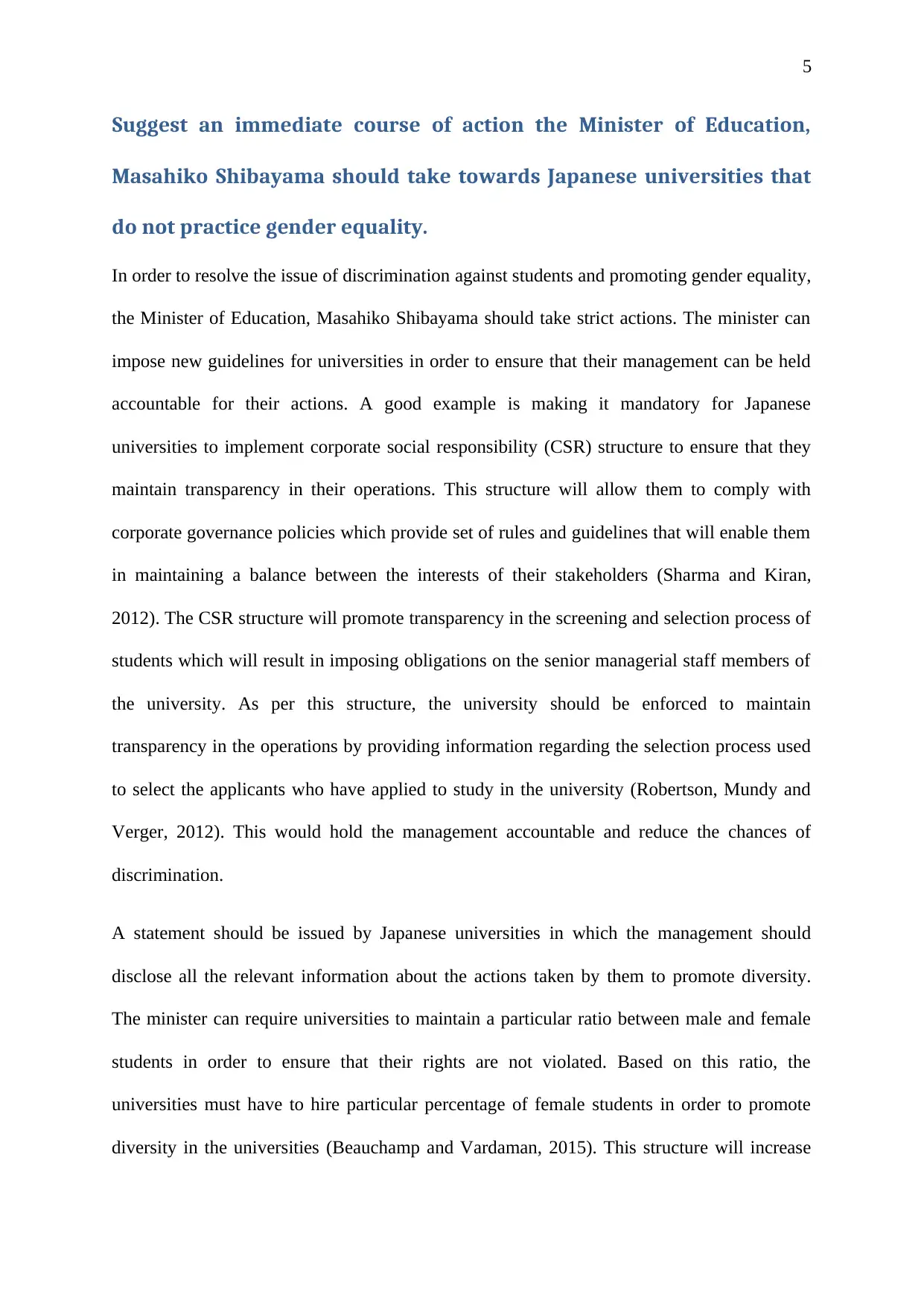
5
Suggest an immediate course of action the Minister of Education,
Masahiko Shibayama should take towards Japanese universities that
do not practice gender equality.
In order to resolve the issue of discrimination against students and promoting gender equality,
the Minister of Education, Masahiko Shibayama should take strict actions. The minister can
impose new guidelines for universities in order to ensure that their management can be held
accountable for their actions. A good example is making it mandatory for Japanese
universities to implement corporate social responsibility (CSR) structure to ensure that they
maintain transparency in their operations. This structure will allow them to comply with
corporate governance policies which provide set of rules and guidelines that will enable them
in maintaining a balance between the interests of their stakeholders (Sharma and Kiran,
2012). The CSR structure will promote transparency in the screening and selection process of
students which will result in imposing obligations on the senior managerial staff members of
the university. As per this structure, the university should be enforced to maintain
transparency in the operations by providing information regarding the selection process used
to select the applicants who have applied to study in the university (Robertson, Mundy and
Verger, 2012). This would hold the management accountable and reduce the chances of
discrimination.
A statement should be issued by Japanese universities in which the management should
disclose all the relevant information about the actions taken by them to promote diversity.
The minister can require universities to maintain a particular ratio between male and female
students in order to ensure that their rights are not violated. Based on this ratio, the
universities must have to hire particular percentage of female students in order to promote
diversity in the universities (Beauchamp and Vardaman, 2015). This structure will increase
Suggest an immediate course of action the Minister of Education,
Masahiko Shibayama should take towards Japanese universities that
do not practice gender equality.
In order to resolve the issue of discrimination against students and promoting gender equality,
the Minister of Education, Masahiko Shibayama should take strict actions. The minister can
impose new guidelines for universities in order to ensure that their management can be held
accountable for their actions. A good example is making it mandatory for Japanese
universities to implement corporate social responsibility (CSR) structure to ensure that they
maintain transparency in their operations. This structure will allow them to comply with
corporate governance policies which provide set of rules and guidelines that will enable them
in maintaining a balance between the interests of their stakeholders (Sharma and Kiran,
2012). The CSR structure will promote transparency in the screening and selection process of
students which will result in imposing obligations on the senior managerial staff members of
the university. As per this structure, the university should be enforced to maintain
transparency in the operations by providing information regarding the selection process used
to select the applicants who have applied to study in the university (Robertson, Mundy and
Verger, 2012). This would hold the management accountable and reduce the chances of
discrimination.
A statement should be issued by Japanese universities in which the management should
disclose all the relevant information about the actions taken by them to promote diversity.
The minister can require universities to maintain a particular ratio between male and female
students in order to ensure that their rights are not violated. Based on this ratio, the
universities must have to hire particular percentage of female students in order to promote
diversity in the universities (Beauchamp and Vardaman, 2015). This structure will increase
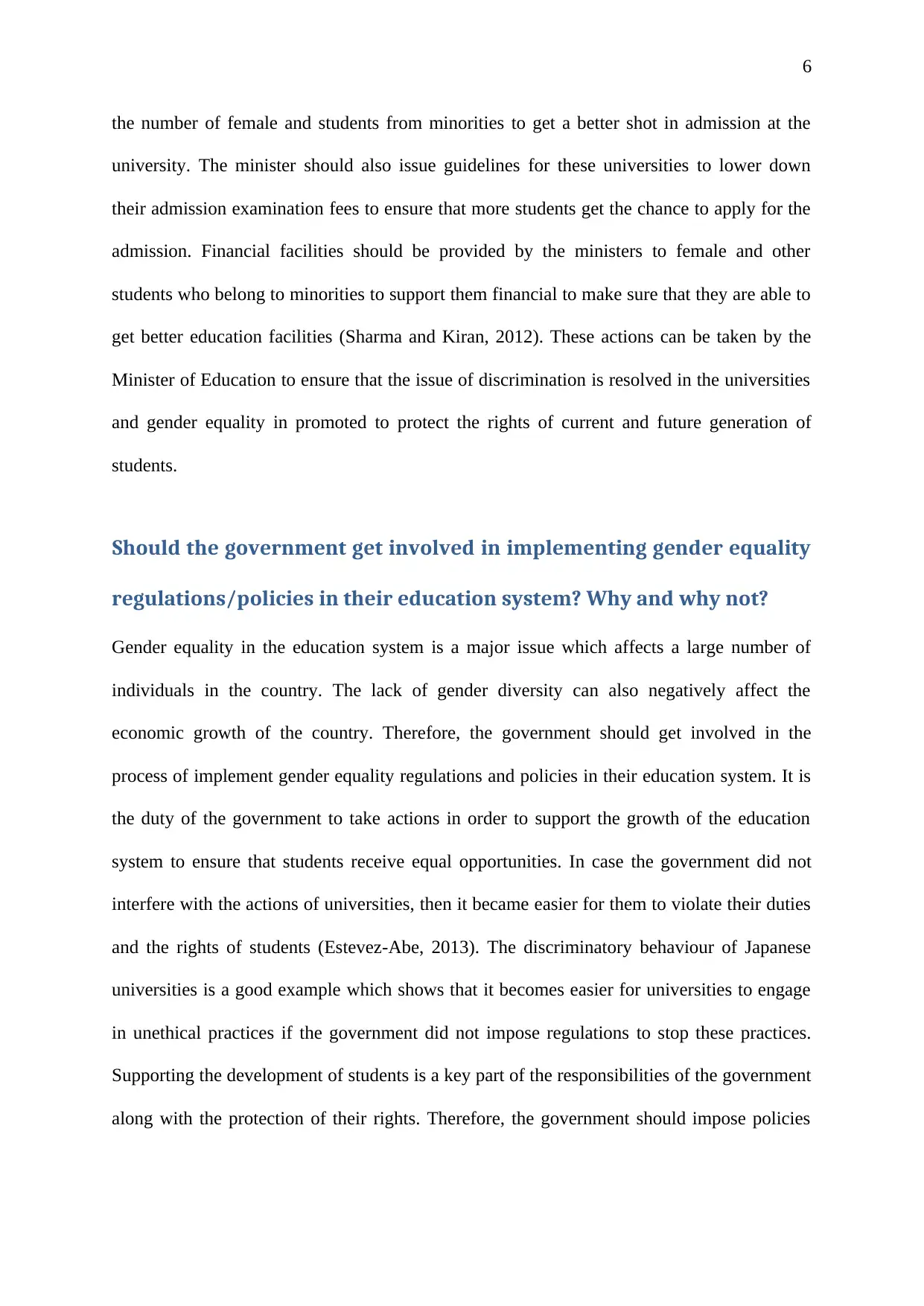
6
the number of female and students from minorities to get a better shot in admission at the
university. The minister should also issue guidelines for these universities to lower down
their admission examination fees to ensure that more students get the chance to apply for the
admission. Financial facilities should be provided by the ministers to female and other
students who belong to minorities to support them financial to make sure that they are able to
get better education facilities (Sharma and Kiran, 2012). These actions can be taken by the
Minister of Education to ensure that the issue of discrimination is resolved in the universities
and gender equality in promoted to protect the rights of current and future generation of
students.
Should the government get involved in implementing gender equality
regulations/policies in their education system? Why and why not?
Gender equality in the education system is a major issue which affects a large number of
individuals in the country. The lack of gender diversity can also negatively affect the
economic growth of the country. Therefore, the government should get involved in the
process of implement gender equality regulations and policies in their education system. It is
the duty of the government to take actions in order to support the growth of the education
system to ensure that students receive equal opportunities. In case the government did not
interfere with the actions of universities, then it became easier for them to violate their duties
and the rights of students (Estevez-Abe, 2013). The discriminatory behaviour of Japanese
universities is a good example which shows that it becomes easier for universities to engage
in unethical practices if the government did not impose regulations to stop these practices.
Supporting the development of students is a key part of the responsibilities of the government
along with the protection of their rights. Therefore, the government should impose policies
the number of female and students from minorities to get a better shot in admission at the
university. The minister should also issue guidelines for these universities to lower down
their admission examination fees to ensure that more students get the chance to apply for the
admission. Financial facilities should be provided by the ministers to female and other
students who belong to minorities to support them financial to make sure that they are able to
get better education facilities (Sharma and Kiran, 2012). These actions can be taken by the
Minister of Education to ensure that the issue of discrimination is resolved in the universities
and gender equality in promoted to protect the rights of current and future generation of
students.
Should the government get involved in implementing gender equality
regulations/policies in their education system? Why and why not?
Gender equality in the education system is a major issue which affects a large number of
individuals in the country. The lack of gender diversity can also negatively affect the
economic growth of the country. Therefore, the government should get involved in the
process of implement gender equality regulations and policies in their education system. It is
the duty of the government to take actions in order to support the growth of the education
system to ensure that students receive equal opportunities. In case the government did not
interfere with the actions of universities, then it became easier for them to violate their duties
and the rights of students (Estevez-Abe, 2013). The discriminatory behaviour of Japanese
universities is a good example which shows that it becomes easier for universities to engage
in unethical practices if the government did not impose regulations to stop these practices.
Supporting the development of students is a key part of the responsibilities of the government
along with the protection of their rights. Therefore, the government should impose policies
Paraphrase This Document
Need a fresh take? Get an instant paraphrase of this document with our AI Paraphraser
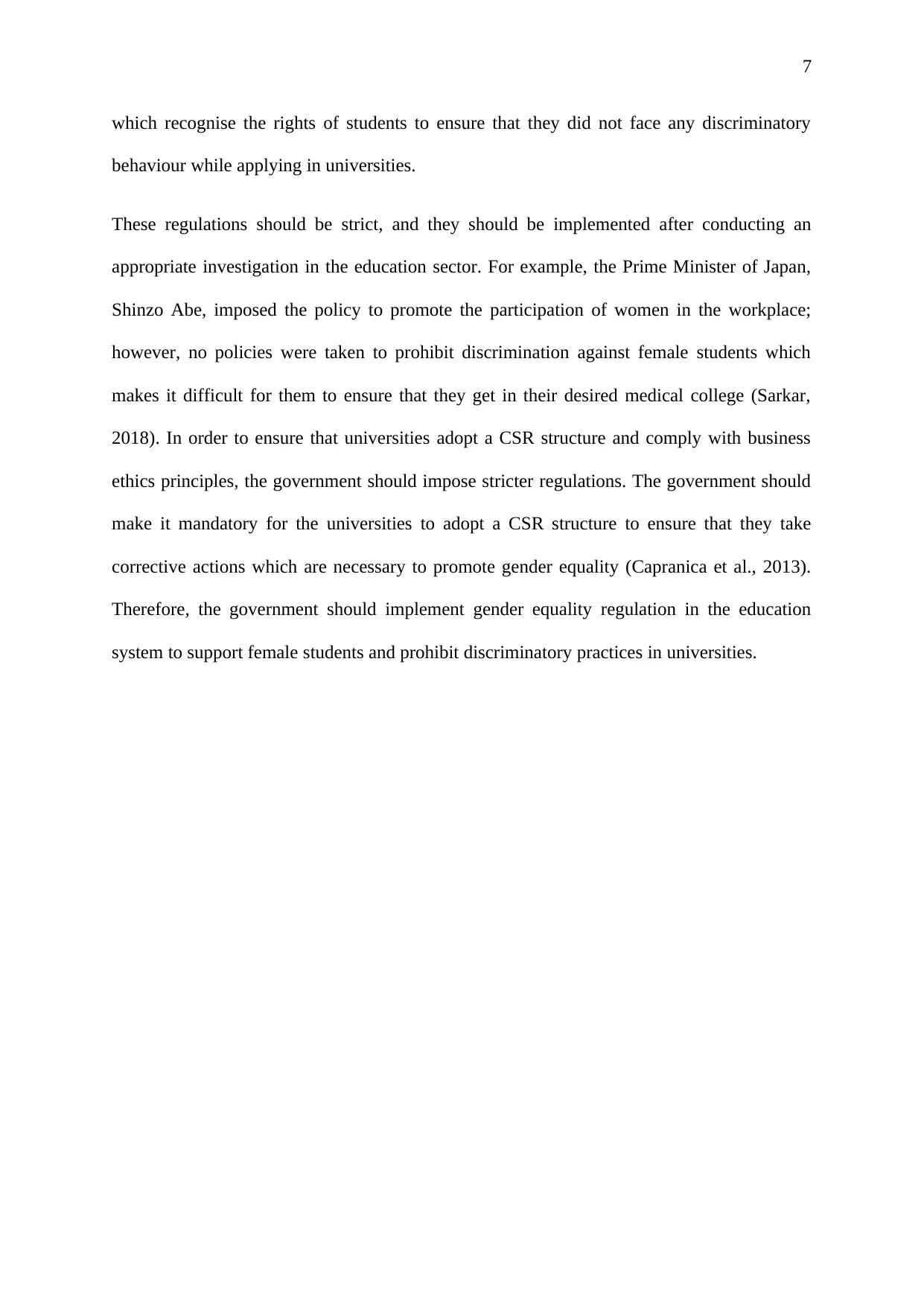
7
which recognise the rights of students to ensure that they did not face any discriminatory
behaviour while applying in universities.
These regulations should be strict, and they should be implemented after conducting an
appropriate investigation in the education sector. For example, the Prime Minister of Japan,
Shinzo Abe, imposed the policy to promote the participation of women in the workplace;
however, no policies were taken to prohibit discrimination against female students which
makes it difficult for them to ensure that they get in their desired medical college (Sarkar,
2018). In order to ensure that universities adopt a CSR structure and comply with business
ethics principles, the government should impose stricter regulations. The government should
make it mandatory for the universities to adopt a CSR structure to ensure that they take
corrective actions which are necessary to promote gender equality (Capranica et al., 2013).
Therefore, the government should implement gender equality regulation in the education
system to support female students and prohibit discriminatory practices in universities.
which recognise the rights of students to ensure that they did not face any discriminatory
behaviour while applying in universities.
These regulations should be strict, and they should be implemented after conducting an
appropriate investigation in the education sector. For example, the Prime Minister of Japan,
Shinzo Abe, imposed the policy to promote the participation of women in the workplace;
however, no policies were taken to prohibit discrimination against female students which
makes it difficult for them to ensure that they get in their desired medical college (Sarkar,
2018). In order to ensure that universities adopt a CSR structure and comply with business
ethics principles, the government should impose stricter regulations. The government should
make it mandatory for the universities to adopt a CSR structure to ensure that they take
corrective actions which are necessary to promote gender equality (Capranica et al., 2013).
Therefore, the government should implement gender equality regulation in the education
system to support female students and prohibit discriminatory practices in universities.
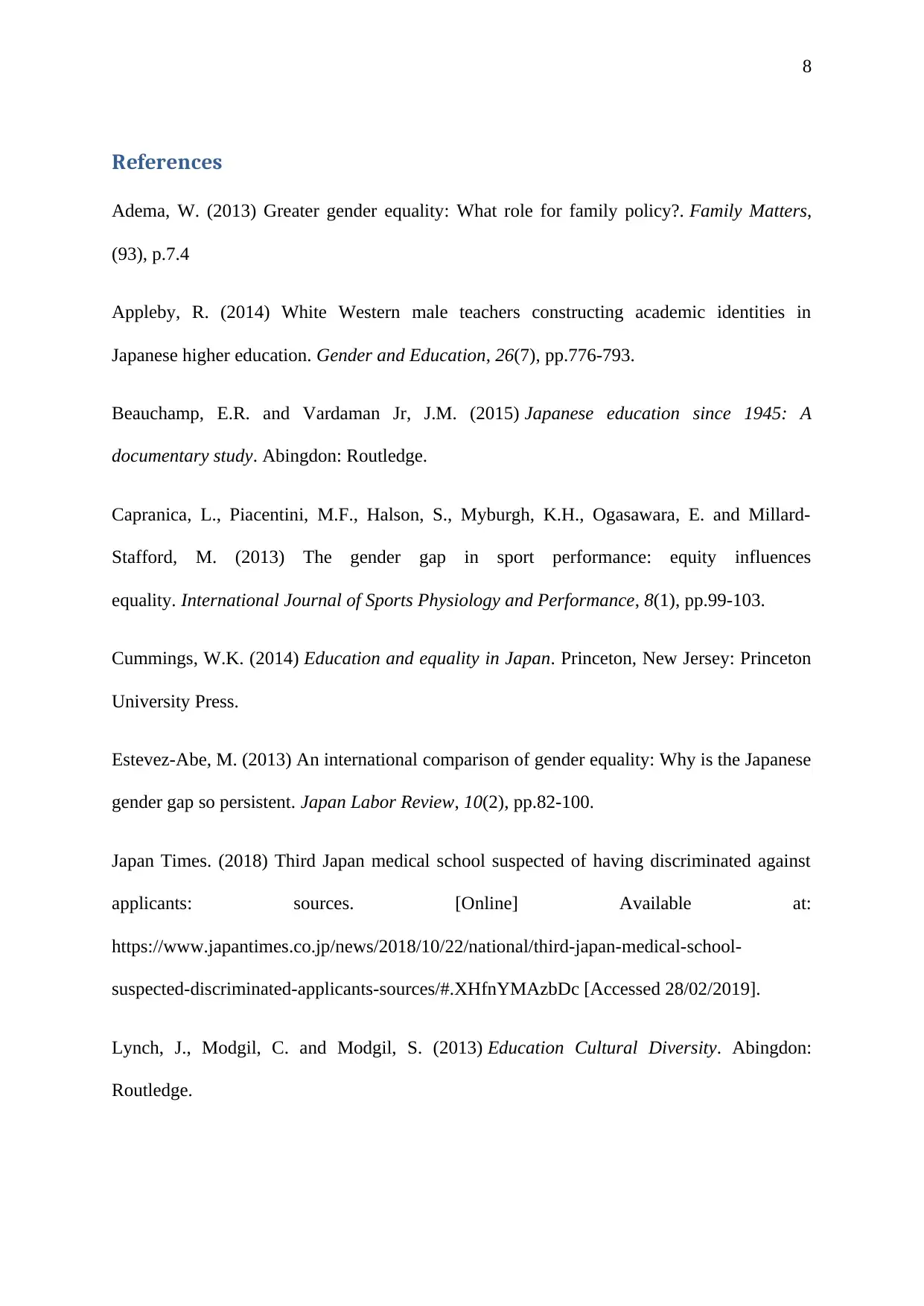
8
References
Adema, W. (2013) Greater gender equality: What role for family policy?. Family Matters,
(93), p.7.4
Appleby, R. (2014) White Western male teachers constructing academic identities in
Japanese higher education. Gender and Education, 26(7), pp.776-793.
Beauchamp, E.R. and Vardaman Jr, J.M. (2015) Japanese education since 1945: A
documentary study. Abingdon: Routledge.
Capranica, L., Piacentini, M.F., Halson, S., Myburgh, K.H., Ogasawara, E. and Millard-
Stafford, M. (2013) The gender gap in sport performance: equity influences
equality. International Journal of Sports Physiology and Performance, 8(1), pp.99-103.
Cummings, W.K. (2014) Education and equality in Japan. Princeton, New Jersey: Princeton
University Press.
Estevez-Abe, M. (2013) An international comparison of gender equality: Why is the Japanese
gender gap so persistent. Japan Labor Review, 10(2), pp.82-100.
Japan Times. (2018) Third Japan medical school suspected of having discriminated against
applicants: sources. [Online] Available at:
https://www.japantimes.co.jp/news/2018/10/22/national/third-japan-medical-school-
suspected-discriminated-applicants-sources/#.XHfnYMAzbDc [Accessed 28/02/2019].
Lynch, J., Modgil, C. and Modgil, S. (2013) Education Cultural Diversity. Abingdon:
Routledge.
References
Adema, W. (2013) Greater gender equality: What role for family policy?. Family Matters,
(93), p.7.4
Appleby, R. (2014) White Western male teachers constructing academic identities in
Japanese higher education. Gender and Education, 26(7), pp.776-793.
Beauchamp, E.R. and Vardaman Jr, J.M. (2015) Japanese education since 1945: A
documentary study. Abingdon: Routledge.
Capranica, L., Piacentini, M.F., Halson, S., Myburgh, K.H., Ogasawara, E. and Millard-
Stafford, M. (2013) The gender gap in sport performance: equity influences
equality. International Journal of Sports Physiology and Performance, 8(1), pp.99-103.
Cummings, W.K. (2014) Education and equality in Japan. Princeton, New Jersey: Princeton
University Press.
Estevez-Abe, M. (2013) An international comparison of gender equality: Why is the Japanese
gender gap so persistent. Japan Labor Review, 10(2), pp.82-100.
Japan Times. (2018) Third Japan medical school suspected of having discriminated against
applicants: sources. [Online] Available at:
https://www.japantimes.co.jp/news/2018/10/22/national/third-japan-medical-school-
suspected-discriminated-applicants-sources/#.XHfnYMAzbDc [Accessed 28/02/2019].
Lynch, J., Modgil, C. and Modgil, S. (2013) Education Cultural Diversity. Abingdon:
Routledge.
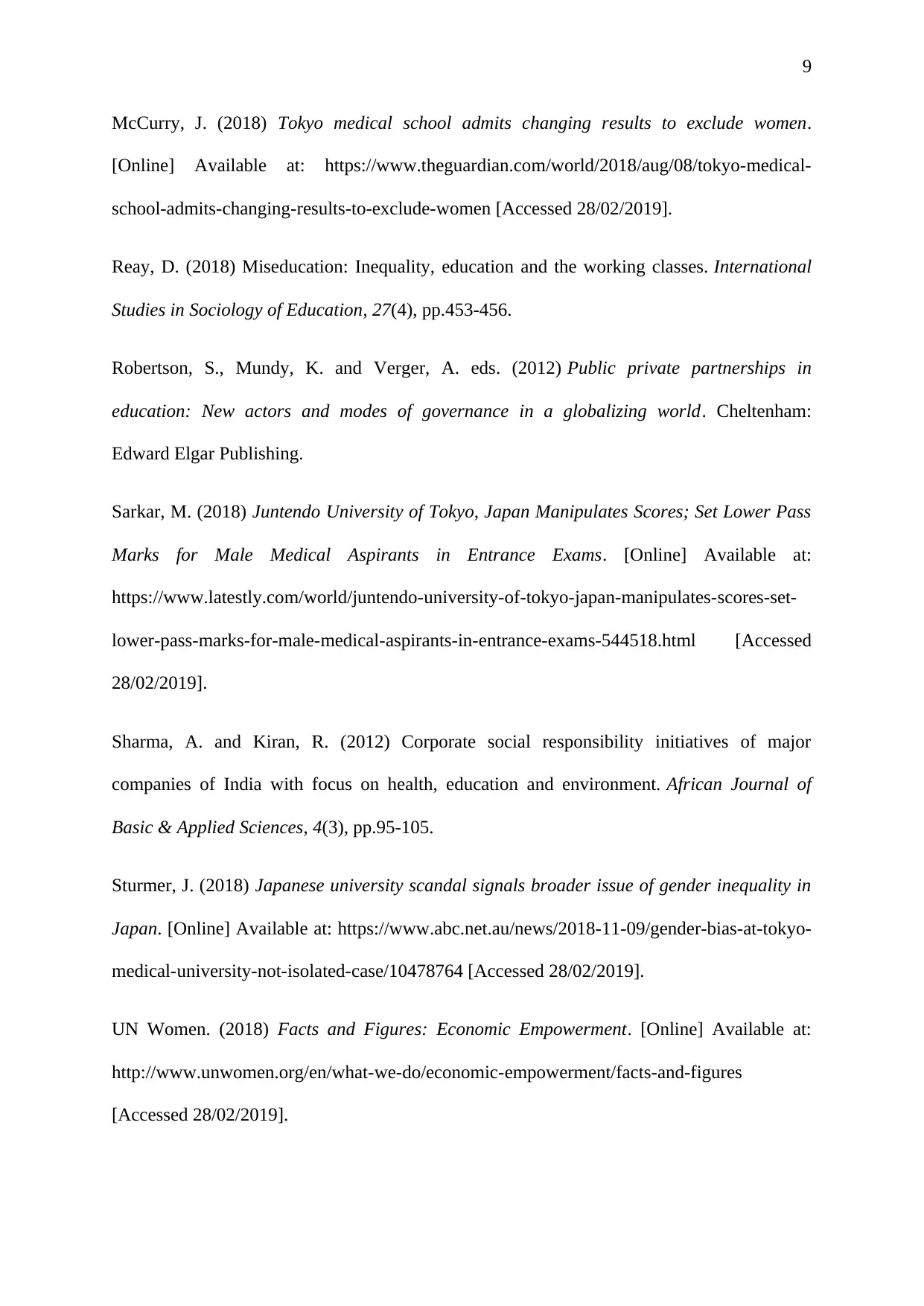
9
McCurry, J. (2018) Tokyo medical school admits changing results to exclude women.
[Online] Available at: https://www.theguardian.com/world/2018/aug/08/tokyo-medical-
school-admits-changing-results-to-exclude-women [Accessed 28/02/2019].
Reay, D. (2018) Miseducation: Inequality, education and the working classes. International
Studies in Sociology of Education, 27(4), pp.453-456.
Robertson, S., Mundy, K. and Verger, A. eds. (2012) Public private partnerships in
education: New actors and modes of governance in a globalizing world. Cheltenham:
Edward Elgar Publishing.
Sarkar, M. (2018) Juntendo University of Tokyo, Japan Manipulates Scores; Set Lower Pass
Marks for Male Medical Aspirants in Entrance Exams. [Online] Available at:
https://www.latestly.com/world/juntendo-university-of-tokyo-japan-manipulates-scores-set-
lower-pass-marks-for-male-medical-aspirants-in-entrance-exams-544518.html [Accessed
28/02/2019].
Sharma, A. and Kiran, R. (2012) Corporate social responsibility initiatives of major
companies of India with focus on health, education and environment. African Journal of
Basic & Applied Sciences, 4(3), pp.95-105.
Sturmer, J. (2018) Japanese university scandal signals broader issue of gender inequality in
Japan. [Online] Available at: https://www.abc.net.au/news/2018-11-09/gender-bias-at-tokyo-
medical-university-not-isolated-case/10478764 [Accessed 28/02/2019].
UN Women. (2018) Facts and Figures: Economic Empowerment. [Online] Available at:
http://www.unwomen.org/en/what-we-do/economic-empowerment/facts-and-figures
[Accessed 28/02/2019].
McCurry, J. (2018) Tokyo medical school admits changing results to exclude women.
[Online] Available at: https://www.theguardian.com/world/2018/aug/08/tokyo-medical-
school-admits-changing-results-to-exclude-women [Accessed 28/02/2019].
Reay, D. (2018) Miseducation: Inequality, education and the working classes. International
Studies in Sociology of Education, 27(4), pp.453-456.
Robertson, S., Mundy, K. and Verger, A. eds. (2012) Public private partnerships in
education: New actors and modes of governance in a globalizing world. Cheltenham:
Edward Elgar Publishing.
Sarkar, M. (2018) Juntendo University of Tokyo, Japan Manipulates Scores; Set Lower Pass
Marks for Male Medical Aspirants in Entrance Exams. [Online] Available at:
https://www.latestly.com/world/juntendo-university-of-tokyo-japan-manipulates-scores-set-
lower-pass-marks-for-male-medical-aspirants-in-entrance-exams-544518.html [Accessed
28/02/2019].
Sharma, A. and Kiran, R. (2012) Corporate social responsibility initiatives of major
companies of India with focus on health, education and environment. African Journal of
Basic & Applied Sciences, 4(3), pp.95-105.
Sturmer, J. (2018) Japanese university scandal signals broader issue of gender inequality in
Japan. [Online] Available at: https://www.abc.net.au/news/2018-11-09/gender-bias-at-tokyo-
medical-university-not-isolated-case/10478764 [Accessed 28/02/2019].
UN Women. (2018) Facts and Figures: Economic Empowerment. [Online] Available at:
http://www.unwomen.org/en/what-we-do/economic-empowerment/facts-and-figures
[Accessed 28/02/2019].
Secure Best Marks with AI Grader
Need help grading? Try our AI Grader for instant feedback on your assignments.

10
Wheeler, G. (2018) The Tokyo Medical University entrance exam scandal: lessons
learned. International Journal for Educational Integrity, 14(1), p.14.
Wheeler, G. (2018) The Tokyo Medical University entrance exam scandal: lessons
learned. International Journal for Educational Integrity, 14(1), p.14.
1 out of 11
Your All-in-One AI-Powered Toolkit for Academic Success.
+13062052269
info@desklib.com
Available 24*7 on WhatsApp / Email
![[object Object]](/_next/static/media/star-bottom.7253800d.svg)
Unlock your academic potential
© 2024 | Zucol Services PVT LTD | All rights reserved.



